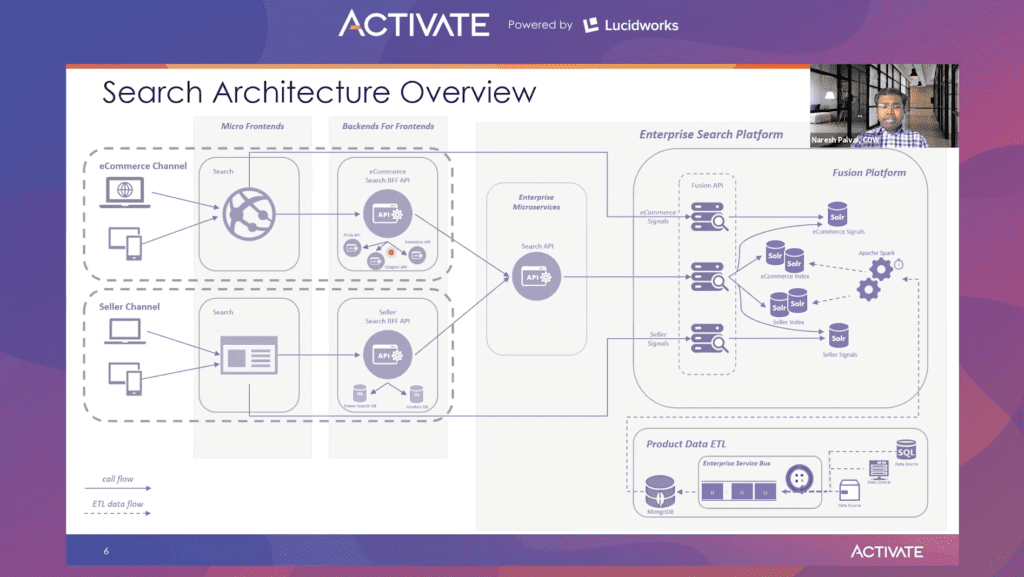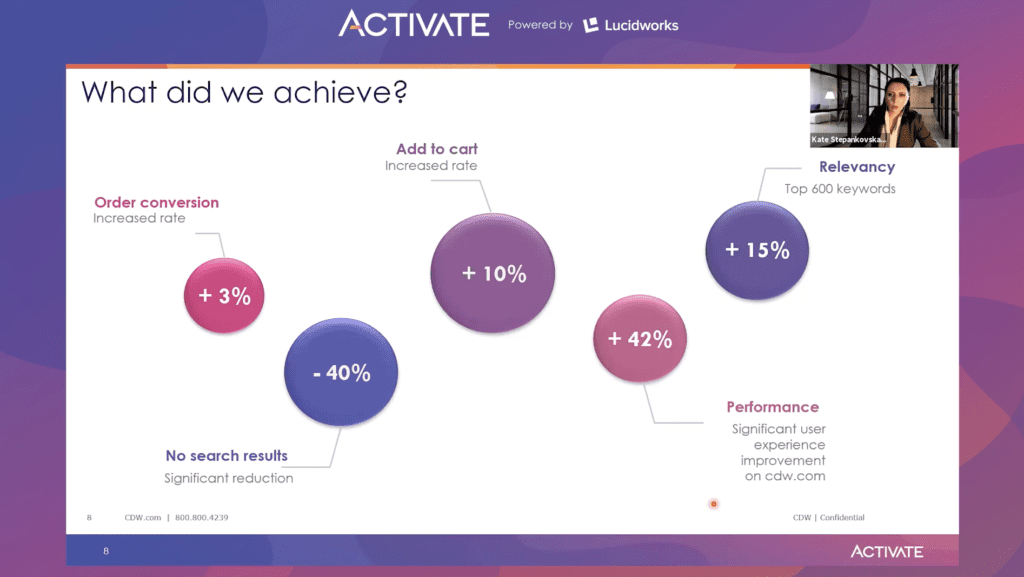CDW’s B2B Omnichannel Ecommerce Strategy
Lucidworks Fusion was chosen as the vehicle to move CDW search capabilities into the future. Replacing Endeca with Fusion increased KPIs dramatically.

Global technology giant CDW has a catalog that includes thousands of brands and a diverse inventory of products from laptops to datacenters. In 2018, the company decided to create an omnichannel search experience for its sellers and customers to unify and personalize their experiences with the brand. To make this happen, the firm had to replace the Endeca engine driving its search. Two search implementations, both on Endeca, had separate logic created to serve CDW’s sellers and ecommerce customers.
At this year’s virtual Activate, the Search and AI conference, CDW Lead Application Developer Naresh Palvai and Application Development Manager Kate Stephankovskaya shared the two year journey CDW took from evaluation to implementation of a new AI-powered search experience that improved relevancy, reduced null search results, and increased add-to-cart and conversion rate.
According to Palvai, “At CDW, we believe in delivering the right solutions that align with business priorities and improve customers’ experience.” So they began the omnichannel search conversion process by partnering with an industry leading consulting firm to evaluate top search engines in the market and determine which would best fit the needs of a complex business like CDW. “Throughout this evaluation, Lucidworks Fusion scored high, given its artificial intelligence, machine learning and multi-tenancy capability,“ said Palvai.
Lucidworks Fusion was chosen as the vehicle to move CDW search capabilities into the future.
Rollout
Partnering with Lucidworks engineers, CDW conducted a pilot program where CDW’s catalogue data was indexed in the platform and the applicability of Fusion’s features to CDW’s use case was evaluated. The pilot was successful and with its success came confidence in the product as well as stakeholders’ blessings on moving forward with using Fusion to power omnichannel search.
CDW’s team of 10 to 15 developers partnered with Lucidworks to deliver the project and by the end of Q4 2019 the feature set was complete.
Then the focus was on relevancy tuning, which was a multi-stage process:
- Stage 1: Gather rules from product owners and merchandising teams.
- Stage 2: Iterate on rules provided and conduct user group testing with ecommerce customers. Simultaneously, roll out the new search engine in beta phases to CDW sellers and collect feedback.
- Stage 3: Roll out Fusion search to CDW sellers in phases in Q1 2020. Begin rolling out Fusion search to ecommerce customers by mid Q2. Serve all sellers and ecommerce customers on all three of CDW’s websites: www.cdw.com, www.cdwg.com, and www.cdw.ca with the new search platform by the end of Q2 2020.
Architecture

CDW architected search with the goal of delivering an omnichannel search experience for both the ecommerce and sellers platforms. To achieve this they used:
- Micro frontends, which allow for faster feature development, easier upgrades, and easier cross-team collaboration.
- Backends for frontends. The backend for frontend microservice is called Application Specific Business Logic, and settles the frontend needs.
- Once the request is received by this microservice, it goes on to the Enterprise Microservices. The Enterprise Microservices is where the core search business logic lives, and it acts as a bridge between the Fusion platform and the frontend assets. The Enterprise Microservice translates requests from various channels into Fusion specific language and is a gateway to Fusion.
Behind these two separate pathways lies a unifying Fusion architecture. Two separate platforms are needed for ecommerce buyers and CDW sellers because the catalogs differ and search patterns differ between the two user types. Fusion runs the side-by-side ecommerce and sellers platforms simultaneously. According to Palvai, “Fusion really helped us to shape the platform and deliver those variations when needed.”
Rather than integrating Fusion with all of the data sources of product content along with price, stock status, coupons, and customer associations, and complex contact attribution data, CDW uses MongoDB to detect changes in data sources and write it to MongoDB via Enterprise Service Bus. The team then used Fusion’s out-of-the-box Parallel Bulk Loader to move data from MongoDB to the Fusion platform.
Previously, CDW had indexed its platform once per day, and while the Parallel Bulk Loader option worked for this interval, it didn’t allow CDW to reach its goal of indexing the platform once every eight minutes. Ultimately, by developing a custom Spark job, the team was able to move data more rapidly and index the platform every eight minutes.
Using Signals
Much to the chagrin of Lucidworks, in the initial Fusion launch, CDW collected, but did not apply signals because they had a third-party relevancy booster. Once signals were applied in Fusion, there was an immediate impact to the top keywords.
CDW began to collect signals, like click, cart, purchase, and aggregate them overnight to apply them to the relevancy. Now signals improve relevancy daily without human intervention. Signals from both the ecommerce and sellers side go to their own collections and then can be combined to deliver a true omnichannel experience across platforms.
Signals, powering a Fusion analytics dashboard, also allow business leaders to make meaningful, data-driven business decisions.
A Vote for A/B Testing
Since small ecommerce system tweaks can have big effects on revenue, stripping out and replacing an entire search engine can feel daunting. A/B testing can make the change less of a blind leap. CDW A/B tested search terms throughout the rollout stage in order to prove that Fusion could categorically beat Endeca in both performance and revenue KPIs.
CDW supports three websites: www.cdw.com for corporate business, www.cdwg.com for government organizations, and www.cdw.ca for the Canadian market. It rolled out Fusion search initially on the Canadian website, running it side-by-side with Endeca, with half of users seeing the new Fusion-driven experience and half the old Endeca one.
After monitoring the KPIs for a week and confident that Fusion was the way forward, 100% of the search traffic for the Canadian site was moved to Fusion. This was repeated for the corporate and government websites until all three websites were running 100% on Fusion.
The rollout took 6 weeks to complete, but allowed CDW to minimize the impact of any stabilization issues and understand the impact of Fusion on KPIs.
Fusion’s Impact on Performance and the Business
By taking baseline metrics and tracking like metrics, the CDW team was able to confidently report on KPIs established by business partners, and understand what went well and what needed tuning.

The impact of search moving 100% to Fusion on the KPIs designated by the business were as follows:
- Order conversion rate increased by 3% compared to Endeca
- No search results has dropped significantly by 40%
- Add-to-cart increased by 10% compared to Endeca
- Relevancy of the search results improved by 15% for the top 600 keywords
Additionally, page performance improved by 42%. This was measured by leveraging A/B testing capabilities and adding JavaScript objects to Endeca and Fusion search pages, so real users’ performance could be monitored on both pages.
The Roadmap
Having completed the Endeca replacement project, the Fusion roadmap at CDW includes the following:
- Create a cloud-ready architecture by moving microservices to a Kubernetes platform, allowing integration with Fusion 5.0 to scale on demand.
- Improve personalization by better understanding user intent, allowing more personalized and relevant search results to their precise use cases.
- Implement a recommendation engine that understands customer behavior and recommends appropriate products.
- Roll out an AI-powered chatbot that understands and services customers’ needs.
- Real-time data streaming. Today CDW does near real-time indexing in the search engine, but it wants to improve that further by stream changes in real-time to the Fusion platform.
To learn how Fusion users Red Hat and Lenovo have improved their customers’ experience, watch their 2020 virtual Activate talks.
Reach out today if you’d like to hear how Lucidworks can improve B2B ecommerce search and product discovery at your organization.
LEARN MORE
Contact us today to learn how Lucidworks can help your team create powerful search and discovery applications for your customers and employees.